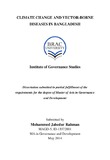| dc.contributor.advisor | Bashar, Kabirul | |
| dc.contributor.author | Rahman, Mohammed Jahedur | |
| dc.date.accessioned | 2014-09-04T04:32:44Z | |
| dc.date.available | 2014-09-04T04:32:44Z | |
| dc.date.copyright | 2014 | |
| dc.date.issued | 2014-05 | |
| dc.identifier.other | ID 13372001 | |
| dc.identifier.uri | http://hdl.handle.net/10361/3530 | |
| dc.description | This thesis is submitted in partial fulfillment of the requirements for the degree of Masters of Arts in Governance and Development, 2014. | en_US |
| dc.description | Cataloged from PDF version of thesis. | |
| dc.description | Includes bibliographical references (page 45 - 56). | |
| dc.description.abstract | Background
Climate change is an occurring phenomenon that creates extreme weather patterns and these weather patterns have a direct impact on vector-borne diseases. The relationship between climatic factors and vector-borne diseases is very important to determine parasite activity levels and disease risk. Therefore, the present study was conducted to explore the effect of climatic change on the transmission of vector-borne diseases in Bangladesh.
Methods
Thirty years climatic data (temperature, rainfall, and humidity) were collected from the meteorological department of Bangladesh. Morbidity and mortality data of different vector-borne diseases were collected from the office of Director General of Health (DG Health) of Bangladesh. Data were analyzed using SPSS to find out the association between climatic variables and vector-borne diseases.
Results
From linear regression analysis we found an upward trend of both in mean (r2=0.402), maximum (r2=0.225) and minimum (r2=0.412) temperature. Yearly average humidity failed to show a constant trend (r2=0.30). We did not found any upward or downward trend of rainfall (r2= 0.03) in Bangladesh. From Pearson correlation test we found weak association between the climatic variables and the vector-borne diseases. We did not found significant relation with climatic variables and dengue (P>0.05), malaria (P>0.05) and Kala-azar (P>0.05) after generating mathematical model.
Conclusion
Our study demonstrates that the climatic variables do not have significant effect on the transmission of the aforementioned vector borne diseases in Bangladesh. Multiple environmental factors are may be responsible for diseases transmission. This study recommends government authority to cautiously consider complex nature of relationship between diseases and climatic factors. Detail studies of vector bionomics, continuous monitoring and disease transmission dynamics is essential for predicting outbreaks of diseases and if necessary, control of vectors in Bangladesh. | en_US |
| dc.description.statementofresponsibility | Mohammed Jahedur Rahman | |
| dc.format.extent | 76 pages | |
| dc.language.iso | en | en_US |
| dc.publisher | BRAC University | en_US |
| dc.rights | BRAC University thesis reports are protected by copyright. They may be viewed from this source for any purpose, but reproduction or distribution in any format is prohibited without written permission. | |
| dc.subject | Governance and development | en_US |
| dc.subject | Climatic variables | en_US |
| dc.subject | Vector-borne diseases | en_US |
| dc.subject | Temperature | en_US |
| dc.subject | Rainfall | en_US |
| dc.subject | Dengue | en_US |
| dc.subject | Kala-azar | en_US |
| dc.subject | Malaria | en_US |
| dc.subject | Climate change | en_US |
| dc.title | Climate change and vector-borne diseases in Bangladesh | en_US |
| dc.type | Thesis | en_US |
| dc.contributor.department | Institute of Governance Studies, BRAC University | |
| dc.description.degree | M. Governance and Development | |

